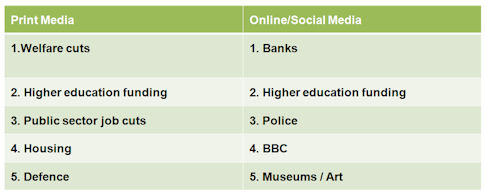Philip Lynch, evaluation director at media evaluation firm Kantar Media, analysed UK’s media coverage of the Comprehensive Spending Review last month and found that there was a massive difference between what traditional print media and social media were discussing. He explains his findings to PRmoment.
Spending Review Media Interest 14th - 21st Oct 2010
.jpg)
“It’s always enlightening to analyse the media’s response to major news stories. Look at the sources and motivations for positive or negative comment, and identify the pundits and companies that are most quoted or the column inches given to particular stories. When we looked at coverage of the Government’s Comprehensive Spending Review (CSR) in the run up to and the day of the announcement, we were surprised to see a significant difference in the topics deemed as ‘important’ among online social media and traditional print media.
Top 5 areas that sparked interest by media were:

“Internet buzz was still dominated by the role of the banks in causing the economic downturn and therefore being responsible for the brutal nature of the CSR. For the mainstream media, however, the banks were a minority interest and the focus was consistently on the impact of welfare cuts. In essence, social media remained concerned with the cause of the problem, whereas the mainstream media had moved on to consider the symptoms.
“Further disconnects emerged in the research, with only higher education funding being consistently mentioned as a hot issue in both types of media.
“Pensions (including the issue of retirement age which caused the revolt in France), concerns about sufficient police cover, child benefit cuts and the BBC licence fee freezes generated the most debate overall.
"Targets that generated the least debate online and offline were the Film Council closing down, Civil List changes and the Severn Barrage being cancelled.
“It is clear that the proliferation of new sources has broadened the news agenda. Certainly, the environment for PR has become less straightfoward to predict and to plan for. There is a wider range of voices and greater diversity of opinion. There is less consensus around what issues are important, and even less agreement on what these issues mean. However, it could also prove to be an opportunity for PR professionals already accustomed to tailoring stories for different media. An angle that sinks in the national press could fly online.”
Methodology:
The objective of the research was to measure the sense of a) media concern around each of the major targets of the Comprehensive Spending Review, and b) to map mainstream interest against the wider buzz in online and social. 3,796 newspaper articles and 4,063,000 online mentions were tracked.
The online research consisted of analysing all publicly accessible blogs, forums, message boards in English combining statistics from a mix of Kantar Media’s metabase, Icerocket and Google Blogs. Sites with privacy protection were excluded.
For mainstream newspapers, Kantar Media tracked all relevant coverage published in daily national newspapers and daily paid-for regional newspapers. Newspapers were analysed from 14 October to the morning of 21 October and online from 14 October to midnight 20 October.
PR Masterclass: The Intersection of PR and GEO
Wednesday 25th February, both virtual and in person tickets are available.
PR MasterclassIf you enjoyed this article, sign up for free to our twice weekly editorial alert.
We have six email alerts in total - covering ESG, internal comms, PR jobs and events. Enter your email address below to find out more:








